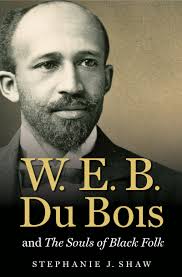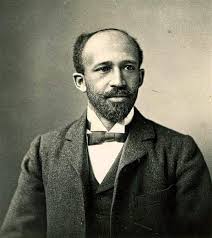The Souls of Black Folk Page #11
The Souls of Black Folk is a 1903 work of American literature by W. E. B. Du Bois. It is a seminal work in the history of sociology and a cornerstone of African-American literature. The book contains several essays on race, some of which the magazine Atlantic Monthly had previously published.
But the hushing of the criticism of honest opponents is a dangerous thing. It leads some of the best of the critics to unfortunate silence and paralysis of effort, and others to burst into speech so passionately and intemperately as to lose listeners. Honest and earnest criticism from those whose interests are most nearly touched,—criticism of writers by readers,—this is the soul of democracy and the safeguard of modern society. If the best of the American Negroes receive by outer pressure a leader whom they had not recognized before, manifestly there is here a certain palpable gain. Yet there is also irreparable loss,—a loss of that peculiarly valuable education which a group receives when by search and criticism it finds and commissions its own leaders. The way in which this is done is at once the most elementary and the nicest problem of social growth. History is but the record of such group-leadership; and yet how infinitely changeful is its type and character! And of all types and kinds, what can be more instructive than the leadership of a group within a group?—that curious double movement where real progress may be negative and actual advance be relative retrogression. All this is the social student’s inspiration and despair. Now in the past the American Negro has had instructive experience in the choosing of group leaders, founding thus a peculiar dynasty which in the light of present conditions is worth while studying. When sticks and stones and beasts form the sole environment of a people, their attitude is largely one of determined opposition to and conquest of natural forces. But when to earth and brute is added an environment of men and ideas, then the attitude of the imprisoned group may take three main forms,—a feeling of revolt and revenge; an attempt to adjust all thought and action to the will of the greater group; or, finally, a determined effort at self-realization and self-development despite environing opinion. The influence of all of these attitudes at various times can be traced in the history of the American Negro, and in the evolution of his successive leaders. Before 1750, while the fire of African freedom still burned in the veins of the slaves, there was in all leadership or attempted leadership but the one motive of revolt and revenge,—typified in the terrible Maroons, the Danish blacks, and Cato of Stono, and veiling all the Americas in fear of insurrection. The liberalizing tendencies of the latter half of the eighteenth century brought, along with kindlier relations between black and white, thoughts of ultimate adjustment and assimilation. Such aspiration was especially voiced in the earnest songs of Phyllis, in the martyrdom of Attucks, the fighting of Salem and Poor, the intellectual accomplishments of Banneker and Derham, and the political demands of the Cuffes. Stern financial and social stress after the war cooled much of the previous humanitarian ardor. The disappointment and impatience of the Negroes at the persistence of slavery and serfdom voiced itself in two movements. The slaves in the South, aroused undoubtedly by vague rumors of the Haytian revolt, made three fierce attempts at insurrection,—in 1800 under Gabriel in Virginia, in 1822 under Vesey in Carolina, and in 1831 again in Virginia under the terrible Nat Turner. In the Free States, on the other hand, a new and curious attempt at self-development was made. In Philadelphia and New York color-prescription led to a withdrawal of Negro communicants from white churches and the formation of a peculiar socio-religious institution among the Negroes known as the African Church,—an organization still living and controlling in its various branches over a million of men. Walker’s wild appeal against the trend of the times showed how the world was changing after the coming of the cotton-gin. By 1830 slavery seemed hopelessly fastened on the South, and the slaves thoroughly cowed into submission. The free Negroes of the North, inspired by the mulatto immigrants from the West Indies, began to change the basis of their demands; they recognized the slavery of slaves, but insisted that they themselves were freemen, and sought assimilation and amalgamation with the nation on the same terms with other men. Thus, Forten and Purvis of Philadelphia, Shad of Wilmington, Du Bois of New Haven, Barbadoes of Boston, and others, strove singly and together as men, they said, not as slaves; as “people of color,” not as “Negroes.” The trend of the times, however, refused them recognition save in individual and exceptional cases, considered them as one with all the despised blacks, and they soon found themselves striving to keep even the rights they formerly had of voting and working and moving as freemen. Schemes of migration and colonization arose among them; but these they refused to entertain, and they eventually turned to the Abolition movement as a final refuge. Here, led by Remond, Nell, Wells-Brown, and Douglass, a new period of self-assertion and self-development dawned. To be sure, ultimate freedom and assimilation was the ideal before the leaders, but the assertion of the manhood rights of the Negro by himself was the main reliance, and John Brown’s raid was the extreme of its logic. After the war and emancipation, the great form of Frederick Douglass, the greatest of American Negro leaders, still led the host. Self-assertion, especially in political lines, was the main programme, and behind Douglass came Elliot, Bruce, and Langston, and the Reconstruction politicians, and, less conspicuous but of greater social significance, Alexander Crummell and Bishop Daniel Payne. Then came the Revolution of 1876, the suppression of the Negro votes, the changing and shifting of ideals, and the seeking of new lights in the great night. Douglass, in his old age, still bravely stood for the ideals of his early manhood,—ultimate assimilation through self-assertion, and on no other terms. For a time Price arose as a new leader, destined, it seemed, not to give up, but to re-state the old ideals in a form less repugnant to the white South. But he passed away in his prime. Then came the new leader. Nearly all the former ones had become leaders by the silent suffrage of their fellows, had sought to lead their own people alone, and were usually, save Douglass, little known outside their race. But Booker T. Washington arose as essentially the leader not of one race but of two,—a compromiser between the South, the North, and the Negro. Naturally the Negroes resented, at first bitterly, signs of compromise which surrendered their civil and political rights, even though this was to be exchanged for larger chances of economic development. The rich and dominating North, however, was not only weary of the race problem, but was investing largely in Southern enterprises, and welcomed any method of peaceful cooperation. Thus, by national opinion, the Negroes began to recognize Mr. Washington’s leadership; and the voice of criticism was hushed.
Translation
Translate and read this book in other languages:
Select another language:
- - Select -
- 简体中文 (Chinese - Simplified)
- 繁體中文 (Chinese - Traditional)
- Español (Spanish)
- Esperanto (Esperanto)
- 日本語 (Japanese)
- Português (Portuguese)
- Deutsch (German)
- العربية (Arabic)
- Français (French)
- Русский (Russian)
- ಕನ್ನಡ (Kannada)
- 한국어 (Korean)
- עברית (Hebrew)
- Gaeilge (Irish)
- Українська (Ukrainian)
- اردو (Urdu)
- Magyar (Hungarian)
- मानक हिन्दी (Hindi)
- Indonesia (Indonesian)
- Italiano (Italian)
- தமிழ் (Tamil)
- Türkçe (Turkish)
- తెలుగు (Telugu)
- ภาษาไทย (Thai)
- Tiếng Việt (Vietnamese)
- Čeština (Czech)
- Polski (Polish)
- Bahasa Indonesia (Indonesian)
- Românește (Romanian)
- Nederlands (Dutch)
- Ελληνικά (Greek)
- Latinum (Latin)
- Svenska (Swedish)
- Dansk (Danish)
- Suomi (Finnish)
- فارسی (Persian)
- ייִדיש (Yiddish)
- հայերեն (Armenian)
- Norsk (Norwegian)
- English (English)
Citation
Use the citation below to add this book to your bibliography:
Style:MLAChicagoAPA
"The Souls of Black Folk Books." Literature.com. STANDS4 LLC, 2025. Web. 24 Feb. 2025. <https://www.literature.com/book/the_souls_of_black_folk_310>.








Discuss this The Souls of Black Folk book with the community:
Report Comment
We're doing our best to make sure our content is useful, accurate and safe.
If by any chance you spot an inappropriate comment while navigating through our website please use this form to let us know, and we'll take care of it shortly.
Attachment
You need to be logged in to favorite.
Log In